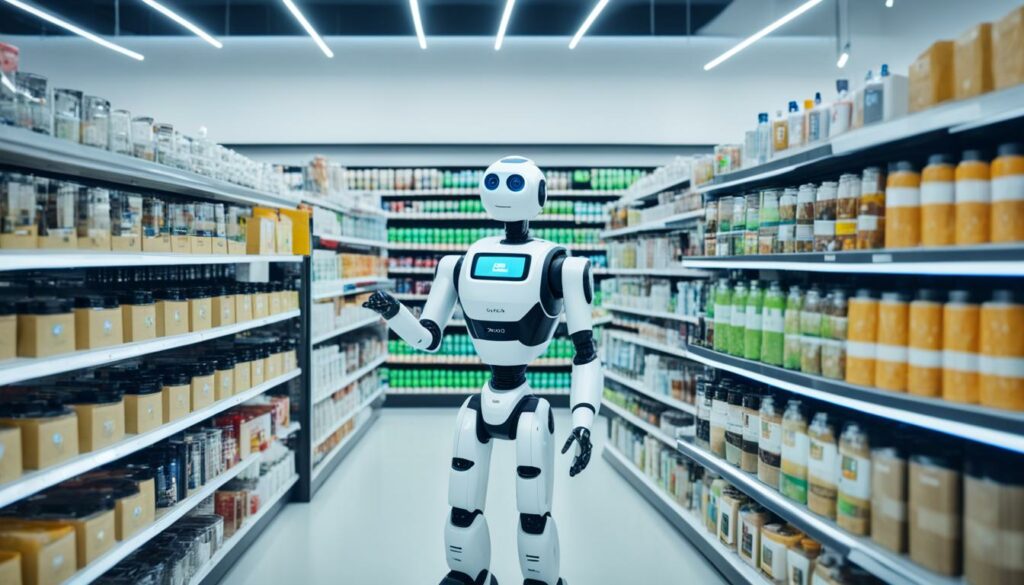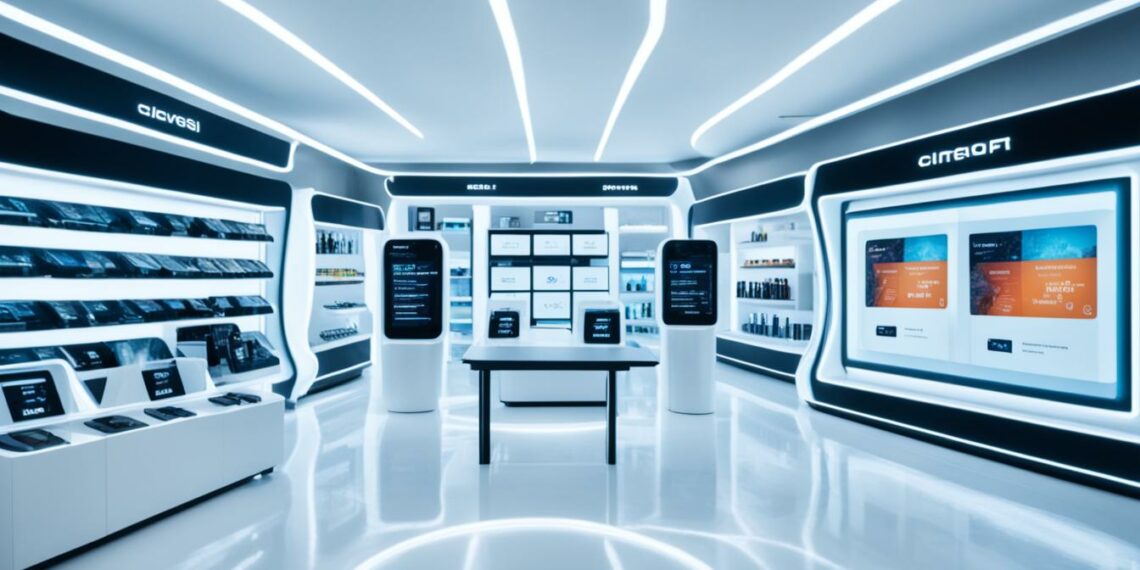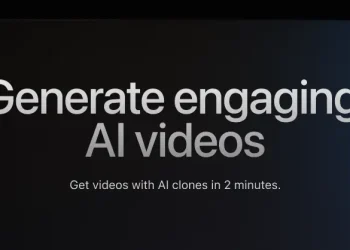Did you know 69% of retailers see more sales thanks to AI? The retail world is changing fast, thanks to AI. This tech is making shopping better and helping stores beat the competition by focusing on customer happiness.
Tools like machine learning and natural language processing are changing retail. They make shopping more personal and give shoppers exactly what they want. The Zendesk 2025 CX Trends Report says 70% of customer experience teams think AI makes talking to customers feel like talking to a person. Brands like Liberty London use AI to make customer service better, cutting down on time to solve problems by 11%.
Looking into retail innovation, AI is key for stores wanting to do well. To learn how AI can help your store succeed, check out this guide.
Key Takeaways
- AI is changing retail with tools that act like human intelligence.
- Machine learning helps stores automate tasks and work better.
- Seventy-two percent of retailers say AI cuts their costs.
- Generative AI makes customer service faster and better.
- AI gives shopping a personal touch, setting stores apart.
- Top brands use AI to boost sales and make customers happier.
Introduction to AI in Retail
The retail world is changing fast thanks to new technology. The introduction to AI in retail is a big deal for businesses. It helps them make customers happier and work better. Retailers are now using new AI solutions to change how they talk to customers.
AI has brought in $40 billion more revenue to the retail sector. By 2020, 85% of companies planned to use AI in their work. This change is more than just using new tools. It’s about a big shift in the retail industry transformation. It focuses on making shopping more personal with data.
Brands that use digital tech for personal shopping see their sales grow by 6% to 10%. This is two to three times faster than their competitors. Retailers see five main areas where AI helps: understanding customers, predicting demand, making personalized choices, optimizing operations, and quick R&D.
The global AI market in retail is expected to hit over $24 billion by 2028 and more than $45 billion by 2032. Leaders in the industry are using AI to solve big problems. For instance, AI can cut down errors by 20-50% in managing supply chains. It could also reduce lost sales and product shortages by up to 65%. For example, Amazon uses AR tech to make online shopping better. Customers can try on products virtually.
Understanding AI and Its Impact on Retail
AI in retail is more than just automation. Retailers use it to change how they talk to customers, make marketing better, and manage stock. For example, Levi Strauss & Co. uses AI to show different body types on Levi.com. This makes shopping better for everyone.
AI can also help cut down on online clothes returns by over 25%. Most returns are because of size or fit issues. This shows how important AI is for making customers happy.
Executives at Tropical Smoothie Cafe are really excited about AI. They see it helping with predicting orders and setting prices. This shows AI’s big role in making retail work better.
But, many retailers are facing challenges. About 60% to 70% don’t fully know their supply chains. This makes tracking stock and setting prices hard. AI can help with this by making pricing better and predicting demand.
Companies are being careful with AI, looking at costs and returns. The National Retail Federation (NRF) has started a group to set standards for AI use. Big names like Amazon, Walmart, and Target are using AI to improve how they work.
Nike bought an AI start-up called Celect to better understand what customers want right now. This shows how important AI is for knowing what shoppers like.
Companies like Anheuser-Busch are using AI to understand what customers think. Amazon’s Just Walk Out system is changing how we buy things by making it faster and smoother.
- Demand forecasting
- Product recommendations
- Cashierless technology
- Automated inventory management
- Customer sentiment analysis
The retail world is changing fast, and AI will be key in making shopping better and operations more efficient.
AI in Retail Industry: Transforming Customer Experience
The retail world is changing fast, thanks to AI. This technology is making shopping better in new ways. Retailers use data to make shopping more personal and improve customer service with new tools.
Hyper-Personalization through AI
Hyper-personalization is big in retail now. It lets brands make shopping feel special for each customer. AI looks at what customers like and what they’ve done before. Then, it shows them products they might like, making them more likely to buy.
For example, when a customer looks at products online, AI can suggest things they might want. This makes them more likely to buy. It also helps increase the amount they spend.
AI Chatbots Enhancing Customer Service
AI chatbots are changing how stores talk to customers. They help 24/7, answering common questions and handling lots of messages. This lets people working in stores focus on harder problems, making customers happier.
AI chatbots make stores work better and help fix problems fast. This makes shopping smooth and easy.
| Feature | AI Shopping Recommendations | AI Chatbots for Customer Service |
|---|---|---|
| Accessibility | 24/7 availability for tailored recommendations | 24/7 availability for instant support |
| Customer Engagement | Increased interaction through personalized suggestions | Improved engagement with prompt responses |
| Efficiency | High conversion rates through tailored targeting | High operational efficiency by handling routine inquiries |
| Data Utilization | Analyzes customer behavior for product recommendations | Utilizes customer data for better service interactions |
Using hyper-personalization and AI chatbots, retail is making shopping better. This is setting a new standard for service and how stores connect with customers.
Key AI Technologies Shaping Retail
Today, using AI in retail is key to staying ahead. Machine learning gives retailers powerful tools to understand customers better and improve services. It helps analyze lots of customer data for better marketing and personalization.
Machine Learning Applications in Retail
Machine learning is crucial in retail. It lets computers sort customer data well. This helps in making marketing that speaks to each customer’s likes.
Stores like Starbucks use these insights to pick the best locations. They look at income and traffic patterns. Machine learning also helps with predicting sales and managing stock, making decisions smarter.
Predictive Analytics for Anticipating Consumer Needs
Predictive analytics helps retailers guess what customers will want. By looking at past sales and trends, they can plan better. For instance, Starbucks uses AI to know what products to stock, making sure they don’t run out.
Big stores like Walmart also use AI to manage their stock better. This means they have what customers want and don’t waste stock.
| AI Technology | Application | Benefits |
|---|---|---|
| Machine Learning | Customer segmentation and personalized marketing | Increased engagement and sales |
| Predictive Analytics | Forecasting consumer demand | Efficient inventory management |
| Natural Language Processing | Chatbots and virtual assistants | Enhanced customer service efficiency |
| AI-driven Marketing | Personalized product recommendations | Improved customer retention |
AI is more than just a trend; it’s changing how retailers connect with customers and run their businesses. By using machine learning and predictive analytics, companies can meet customer needs, grow sales, and improve experiences.
Automation in Retail Industry
Automation is changing how retail businesses work. It helps them work better and make more money. By using AI, stores can manage their stock and process orders faster. This leads to big improvements in how they run every day.
Retailers are using automated systems to work smarter and save money. This means they can manage their resources better and cut costs.
Streamlining Operations with AI
AI is making a big difference in retail. For example, about half of retail tasks can now be automated. Stores that use these new technologies see more customers coming in. In fact, they get 11% more visitors.
This big change shows how important automation is. It’s helping stores work better than ever before.
Benefits of Automated Systems
Automated systems bring lots of good things to retail. Stores using AI see:
- Reduced wait times for customers, making shopping smoother.
- Orders are more accurate, which means fewer mistakes and better service.
- Stores manage their money better with AI, saving on costs.
- Customers like chatbots for quick help, with 62% preferring them.
The retail automation market is expected to grow a lot, from $12.2 billion in 2021 to about $33 billion by 2030. Big stores like Amazon and Walmart are leading the way. They’re using things like self-checkout and cleaning robots to save money and work better.
These new technologies, like self-checkout in 10,000 stores by 2025, show the big impact of AI on retail.
| Metric | Value |
|---|---|
| Global retail automation market (2021) | $12.2 billion |
| Projected market value (2030) | $33 billion |
| Increase in customer visits with automation | 11% |
| Percentage of retail activities automatable | 50% |
| Stores with autonomous checkout by 2025 | 10,000 |
| Potential operational hour savings | 55-65% |
Personalized Shopping Experiences with AI
Retailers now use AI to make shopping more personal and engaging. They use data to understand what customers like, making shopping better for everyone. This approach helps build stronger loyalty to brands.
Utilizing Data for Tailored Recommendations
Did you know that just 7% of visits result in a recommendation click but they bring in 24% of orders and 26% of revenue? This shows how powerful personalization can be. Now, 57% of marketers see AI as key to connecting with customers in a meaningful way.
Customers want new items every time they shop, both online and in-store. If they don’t get personalized messages, 52% might switch brands. This highlights the need for AI to create unique shopping experiences.
AI helps attract and keep customers by offering personalized experiences. About 65% of shoppers stay loyal to brands that do this. Also, using data to personalize can increase conversion rates by 63%.
Most consumers are open to brands that remember their preferences. This means using customer data well can make a big difference. AI also helps personalize shopping across all platforms, making it smooth whether shopping online or in-store.

Personalization can increase revenue by up to 15%. Brands should use AI to better understand and engage with customers. By focusing on personalized shopping, retailers can meet and beat customer expectations, gaining a strong edge in the competitive market.
AI-Powered Inventory Management
AI-powered inventory management systems change how retailers manage their stock. They use advanced algorithms for a modern approach to inventory. This makes stores better stocked and helps businesses make more money.
Enhancing Stock Management Efficiency
Being good at stock management is key to staying ahead in retail. AI-powered systems bring big benefits. They help companies:
- Accurately forecast demand by looking at past sales and market trends.
- Optimize procurement processes, cutting costs and boosting profits.
- Reduce carrying costs by cutting down on deadstock and improving inventory flow.
- Automatically generate purchase orders based on what’s in demand right now.
- Prevent discrepancies between what’s on the books and what’s actually there, saving money.
AI also looks at social media and customer reviews to spot changes in what people want. This helps retailers decide what to stock up on. It makes inventory decisions smarter, helping stores or warehouses have the right products.
| Feature | Benefits |
|---|---|
| Demand Forecasting | Higher accuracy in predicting stock needs. |
| Procurement Optimization | Lower costs and improved inventory turnover. |
| Automated Purchase Orders | Efficient replenishment based on real-time data. |
| Discrepancy Prevention | Avoid losses due to stock-level inaccuracies. |
| Consumer Insight Analysis | Identify emerging trends and adjust inventory accordingly. |
Using AI for inventory management helps retailers give better customer experiences. It makes sure products are always in stock, which makes customers happy. Plus, AI helps with targeted marketing that matches what customers want, which grows the business.
AI and Retail Data Analysis
Retail data analysis with AI changes how companies see their market. It lets retailers get valuable insights from data. This helps them make smart choices to stay ahead.
Many companies see the value of AI in analytics. For instance, those using AI report a 115% higher ROI and a 93% increase in profits in retail, says McKinsey & Company. This shows how AI is good at predicting what customers will do, managing stock, and boosting sales.
AI helps retailers improve many areas, such as:
- Demand Prediction: AI predicts what customers will buy, helping with better stock planning.
- Resource Allocation: Better strategies mean saving money and staying financially strong.
- Personalization: Marketing that’s just right for each customer builds loyalty.
Big names like Walmart use AI to collect lots of data, making shopping smoother. Amazon uses AI to suggest products that match what users like. Stores like H&M and Tesco use AI to spot trends and offer personalized deals.
AI gives retailers a deeper understanding of their customers and helps them make smart choices. This is key to running better operations and keeping customers coming back. As the need for smart data grows, retailers that use AI will stay ahead in a market that’s all about data.
Case Studies of AI Innovations in Retail
Leading brands are using AI to make shopping better and run smoother. The case studies of AI in retail show how these companies are using new strategies to get better results.
How Leading Brands are Adopting AI
Carrefour and Sephora are great examples of AI adoption by leading brands. Carrefour uses AI to let customers make personalized shopping lists. This makes shopping more fun and helps sell more items. Sephora uses AI to give customers product tips based on what they like and have bought before. These examples show different ways AI helps in retail.
Success Stories and Metrics
AI in retail is a big win. Raisin saw an 18% jump in sales with AI. HD Supply got a 16% boost in sales and 4% more items added to carts thanks to AI. AI’s role in retail is key, as 92% of shoppers let AI help them decide what to buy, reducing cart drops.
As retail grows, AI’s focus on innovation and efficiency gets retailers ready for the future and better customer connections.

| Brand | AI Technology Used | Success Metrics |
|---|---|---|
| Carrefour | Personalized Shopping Carts | Increased Customer Engagement |
| Sephora | Product Recommendations | Enhanced Shopping Experience |
| Raisin | Generative AI | 18% Increase in Conversion Rate |
| HD Supply | AI Search Functions | 16% Revenue Increase |
The Future of Retail with AI Technologies
The future of retail looks bright with AI technologies leading the way. These technologies are changing how stores work and how they talk to customers. They’re making shopping better and more efficient.
AI is helping with smart shelves, managing stock, and setting prices. This keeps stores competitive. It also helps them understand what customers want better.
AI uses predictive analytics to improve sales. It looks at what customers buy and who they are. This helps stores suggest products that customers might like. It’s great for upselling and making customers happy, especially the younger ones who like things made just for them.
AI can predict what customers will want. It looks at past sales and things like the weather. This helps stores order stock better and work more efficiently. AI is key to staying ahead in the market.
- Personalization builds loyalty, showing customers they matter.
- Customers want features like product suggestions based on their data.
- Being open about how data is used builds trust in AI.
Stores need to be careful with personalization to avoid making customers feel uneasy. Listening to what customers say is crucial. It helps make sure AI helps workers, not replaces them. This reduces the risk of mistakes or misuse.
AI will play an even bigger role in retail as time goes on. We might see product suggestions based on the time of day or special events. With more money going into AI, it will change retail for the better. It will make stores more profitable, efficient, and improve how customers shop.
Challenges and Considerations for Retailers
Using AI in retail comes with big challenges, especially with data management and ethical use. In 2019, the US retail industry made $5.4 trillion in sales, showing how much AI is now a big part of it. Retailers struggle with data governance in retail, following privacy laws and being clear about how they use data. This worry about privacy stops some retailers from using AI in ways that could really help customers.
Data Governance and Ethical AI Usage
AI in retail also faces issues like biased systems. These can lead to unfair prices and treatment of customers. For instance, Apple’s credit card gave women smaller credit lines than men, even though gender wasn’t part of the decision. This shows why using AI ethically is key to gaining customer trust and loyalty.
About 67% of companies have trouble collecting good data, and 77% struggle to make useful insights from what they have. These problems make it hard to make decisions and use AI well. Around 70% of decision-makers think their teams need more knowledge about AI in retail.
Investing in new AI can also be tough due to training employees and overcoming resistance to change. Almost 60% of people face these issues. Retailers need to focus on ethical AI use to avoid problems and get the most out of AI.
For more on how AI can improve customer connections, check out this resource.
Conclusion
The use of AI in retail is changing how businesses work and connect with customers. Companies that use AI are getting better at what they do and making customers happier. This makes customers more loyal and satisfied. Big names like Amazon and Walmart show how AI can boost sales and cut costs.
AI is becoming more popular and is making a big difference. A European retailer saw a huge profit jump thanks to a smart product mix strategy. With spending on AI expected to hit $7.3 billion by 2022, the trend is clear. AI is making shopping more personal and helping stores manage their stock better.
As retail changes, mixing human touch with AI will be key for stores to stay relevant. They’ll face challenges like how to handle the workforce and the cost of new tech. But, the future looks bright, with AI leading to new growth and better shopping experiences.
FAQ
What is the significance of AI in the retail industry?
AI is changing the retail game by making shopping better, smoother, and more personal. It helps stores understand what customers want and need. This leads to better recommendations and happier customers.
How does predictive analytics benefit retailers?
Predictive analytics helps stores guess what customers will want next. This means they can stock up on popular items and offer better deals. It makes shopping more enjoyable for everyone.
What role do AI chatbots play in customer service?
AI chatbots are superheroes for customer service. They handle simple questions 24/7, freeing up humans to deal with tougher issues. This makes customers happier and stores more efficient.
How is machine learning applied in retail?
Machine learning helps stores predict what customers will do next. It also makes marketing smarter and self-service better. By learning from data, stores can engage more customers and boost sales.
What are the benefits of automation in the retail sector?
Automation makes retail run smoother by handling tasks like stock and orders. This means customers wait less, get their orders right, and stores save money.
How does AI contribute to personalized shopping experiences?
AI uses customer data to make shopping personal. Stores can offer just what each customer likes, making them more loyal and happy.
What technologies are shaping the future of AI in retail?
The future is bright with AI technologies like smart inventory, machine learning, and predictive analytics. These changes are making stores more customer-focused and efficient.
Can you provide examples of brands successfully adopting AI?
Sephora and Carrefour are great examples of AI success. Sephora gives personalized product tips, while Carrefour helps shoppers fill their carts with great finds. These brands show how AI can make shopping better.
What challenges do retailers face when adopting AI?
Stores struggle with data management, privacy laws, and being open about how they use data. Overcoming these hurdles is key to gaining customer trust and safely using AI.
What is the outlook for AI in the retail sector?
The future looks bright for retail and AI. We’ll see more ways to connect with customers and make stores run better. Stores that use AI well will stay ahead in a changing market.




